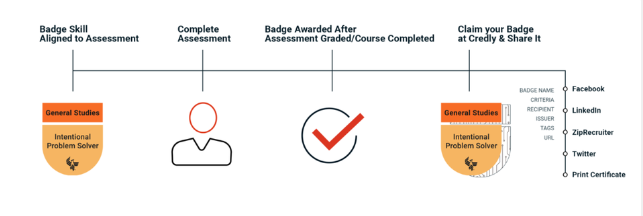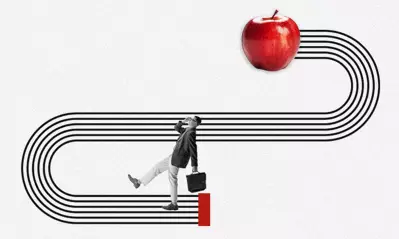Digital badges: What they are and how to get them

Written by Michael Feder

What are digital badges?
Digital badges are icons that indicate a person has successfully demonstrated a certain skill, like emergency preparedness or collaboration. Each badge carries metadata about how and when that skill was learned.
“Digital badges help students tell their skills story,” says Mary Elizabeth Smith, a learning innovation strategist with University of Phoenix (UOPX). “The badge, with its robust metadata, is a vehicle that students can use to articulate their skills and how they were evidenced.”
A digital badge may have:
- Your name
- Which skill you attained
- Where you earned the badge
- A URL to the badge itself or a page with all your badges earned from that institution
- Other key details such as the date you earned the full credential and keywords that recruiters might search for
Digital badges (also known as micro-credentials) can help prove, rather than merely suggest, that you have specific, measurable knowledge.
According to Participate.com : “Digital badges offer a simple way to recognize online learning. Think of a digital badge as not only a line on your resumé noting a particular skill or competency, but also visual evidence documenting how that skill was obtained.”
Because they visually tell a person’s skills story, digital badges can boost the credibility of someone’s personal brand in a quick and compelling way.
What’s the difference between certificates, micro-credentials and digital badges?
For starters, a certificate denotes that a student has completed an education program or course. A badge doesn’t necessarily refer to a course and appears in a more visually appealing form, geared to help you stand out when employers are skimming your credentials.
A micro-credential is a certification of mastery of a skill, multiple skills or a collection of successfully completed courses. This is very similar to a digital badge, and the two terms are often used interchangeably.
Why should you pursue digital badges?
Simply put: because employers care.
According to Harvard Business Review , companies are increasingly moving toward skills-based hiring. Candidates can always share their skills traditionally via text on a resumé. Digital badges, in contrast, are an easy-to-skim, searchable way to convey those skills to current and prospective employers alike via social media.
What’s more, digital badges don’t waste time. UOPX, for example, enables students to identify which skills they’ve learned during their degree programs in real time. Students can then post relevant digital badges to their online platforms as they achieve them. They don’t have to wait four years for a diploma; they can showcase their skills immediately.
UOPX offers digital badges for its associate, bachelor’s and master’s programs because it saw a gap between what skills employers were looking for and what skills candidates actually had. By researching each industry’s career-relevant skills, aligning UOPX curricula with those skills and then working with the digital credentialing platform Credly to provide badging, UOPX has upped the skills game within, and for, the workforce.
How do digital badges help you in your career?
Having to sift through so many candidates, hiring managers skim resumés quickly. One way to stand out from the crowd is through digital badges.
To this, Smith adds that employers may:
- Feel that badge holders have an enhanced professional identity
- Appreciate the transparency into how a candidate’s skills were earned
- Identify who has career-relevant skills within their organization
- Realize the person is invested in remaining up to date in their field
- Determine that a candidate’s skills are aligned with job openings
How to get digital badges
A digital badge is typically earned through a workshop, training program, course or class. At UOPX, a digital badge can be earned in a matter of weeks or months and after completing an assessment.
“To receive a badge for emergency preparedness [for instance], the student must successfully complete two courses and the aligned assignments. Once the student has met the criteria, they are alerted that the badge is ready for them to claim and then share,” Smith explains.
Since the badges students earn at UOPX are stored in Credly accounts, bearers can send them digitally to current employers or recruiters. They can even print them out as certificates.
How do I add a badge to my LinkedIn profile?
You can add a digital badge from UOPX to your LinkedIn® profile in a few easy steps.
How do I add a badge to my resumé or another site?
To add your badge to another type of resumé, you may need to download the badge as an image file and then copy and paste it to your Microsoft Word document or another app that’s hosting your resumé.
The future of digital badges
With 4 in 10 American workers worried technology will render their skills obsolete, and with the rise in skills-based hiring, digital badges are poised to be in high demand.
In fact, people seem to understand this already. UOPX conducted student surveys and focus groups to get a sense of what students needed and found that:
- 76% understand the professional benefit of digital badges
- 64% believe badging will help with advancing their careers
- 75% believe digital badges will make it easier to communicate their skills to potential employer
- 81% have a strong desire to complete their program because of badges
Students aren’t the only ones to recognize the potential of digital badges. As noted, employers are increasingly aware of the need for a skilled workforce , especially when complemented by a degree.
Digital badges, in other words, are the way of the future.
LinkedIn is a registered trademark of LinkedIn Corporation and its affiliates in the United States and/or other countries.

ABOUT THE AUTHOR
A graduate of Johns Hopkins University and its Writing Seminars program and winner of the Stephen A. Dixon Literary Prize, Michael Feder brings an eye for detail and a passion for research to every article he writes. His academic and professional background includes experience in marketing, content development, script writing and SEO. Today, he works as a multimedia specialist at University of Phoenix where he covers a variety of topics ranging from healthcare to IT.
This article has been vetted by University of Phoenix's editorial advisory committee.
Read more about our editorial process.
Read more articles like this:




